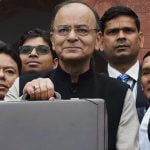
Indian stock markets have posted their best one-month pre-budget gain in 13 years. Benchmark indices have gained 5.6% in the month to Thursday’s Union Budget, riding the coat tails of a worldwide equities rally.
Abundant liquidity and expectations that the budget will boost the rural economy and revive private investment, without compromising on fiscal prudence, have aided the run-up.
The one-month gain has come despite a pullback in the last two sessions following a sell-off in US and Asian markets over concerns of high valuations. On Wednesday, the Sensex fell 68.71 points, or 0.19%, to close at 35,965.02.
Since 2000, the Sensex has gained only eight times in the month leading up to the budget presentation, and rose as much as 11.7% in the run-up in 2002.
Analysts said investors have high hopes of the government reviving investment and growth in the last full budget before next year’s general election.
“We expect the government to focus on rural and capital spending to boost sentiment and revive growth further. However, given the hard-achieved gains on fiscal consolidation, flexibility to go overboard on spending is limited,” said Gautam Duggad, head of research, institutional equities, Motilal Oswal Financial Services Ltd.
The Economic Survey projected India’s economic growth to accelerate to 7.5% in the next financial year from an estimated 6.75% in 2017-18.
Analysts will closely watch the fiscal deficit after chief economic adviser Arvind Subramanian cautioned on Monday that the government won’t rule out a pause in its fiscal consolidation plan.
Analysts said that sticking to the fiscal consolidation roadmap, which had outlined a deficit target equivalent to 3.2% of gross domestic product in the current financial year and 3% in the next, amid growing demand to support economic recovery is the biggest challenge for the government. An anemic rural economy and weak investment cycle add to the concerns.
With a string of state poll this year leading up to the 2019 general election, there are also concerns that the government may present an overly populist budget at a time when rising crude prices are posing a challenge.
Some analysts brushed aside these fears.
“We do not share those concerns and expect a non-disruptive and prudent plan,” Japanese securities house Nomura Holdings Inc. said in a 24 January note. The brokerage expects the government to increase allocations to rural, affordable housing and power schemes, and rely more on off-budget resources to fund capital expenditure on infrastructure.
“The government choosing to target an FY19 fiscal deficit of 3.0% of gross domestic product (GDP) could be the main positive surprise. A fiscal deficit target above 3.2% of GDP, the announcement of a universal basic income transfer scheme or the imposition of a long-term capital gains tax on equities would be negative surprises,” Nomura added.
That said, the stock rally will be sustained only if the promised reforms and growth recovery lead to a pick-up in corporate earnings growth. Analysts are expecting the first signs of a rebound in corporate earnings growth in the December quarter owing to the favourable effect of a low base a year ago and higher consumer spending in the festive season.
There have been no earnings upgrades despite high optimism for a revival of earnings growth, and Indian stock valuations are steep. The Sensex is trading at 19.11 times expected earnings for the next 12 months. For fiscal 2018, the earnings estimate for Sensex firms has been cut by 10.15% since April. For fiscal 2019, it is down 4.24%.
For the bull run and high valuations to be sustainable, an earnings recovery is important, said Amar Ambani, partner and head of research, IIFL Investment Managers, adding that a full-fledged recovery could take 12-15 months.
“Also, it is low cost of capital and improving industrial activity across the globe which is driving foreign money to India. Within corporates, there are many domestic-oriented sectors that have started showing growth,” he added.
[“source=hindustantimes”]




